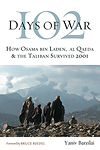
102 Days of War: How Osama bin Laden, al Qaeda & the Taliban Survived 2001, by Yaniv Barzilai, Potomac Books, Dulles, Va., 2014, $24.95
The U.S.-led coalition’s early triumph in Afghanistan in fall 2001 was followed by more than a decade of frustration, bloodshed and expense, a sequel allied forces might have prevented by destroying al-Qaida and the Taliban and capturing its leaders before they fled to Pakistan. Barzilai, a former State Department special representative for Afghanistan and Pakistan, was on the job at the time and writes an engrossing if disheartening report on how the coalition failed to do this.
In the confused days following the Sept. 11, 2001, terrorist attacks, the National Security Council met to determine the George W. Bush administration’s options. There were three—destroy al-Qaida, assuming the Taliban agreed to U.S. demands; destroy both al-Qaida and the Taliban if the latter refused to cooperate; or launch a global war on terrorism that included “eliminating the Iraqi threat.”
Barzilai reminds readers that influential members of the Bush administration, led by Secretary of Defense Donald Rumsfeld and his deputy Paul Wolfowitz, had long yearned to invade Iraq. The 2001 attacks on America energized their arguments, which won over their colleagues by that December when the second option seemed to have run its course.
Once it became clear the Taliban would protect Osama bin Laden, U.S. leaders faced the fact that invading Afghanistan with conventional forces would take months, and—unlike the case with Iraq—no plan existed. The NSC accepted an offer by the Central Intelligence Agency to insert special-ops teams into Afghanistan to direct air support and act as a force multiplier with indigenous rebels, and those teams began arriving in early October 2001. But weeks passed before the Air Force’s ineffective strategic bombing shifted to close support—with spectacular results. Within a month anti-Taliban forces swept south and captured all of Afghanistan’s major cities. This was not the same as total victory, but that’s how it was viewed.
We now know that bin Laden, the Taliban leadership and many fighters retreated into the desolate, mountainous Tora Bora region adjoining Pakistan. There are those who insist no one could have sealed off that border, but Barzilai maintains that only a 6-mile stretch was passable. Pakistani forces looked the other way. Superiors denied repeated requests from the local commander for substantial U.S. reinforcements. Thus, the fate of al-Qaida lay in the hands of, in Barzilai’s words, “93 Western commandos and a contingent of generally untrustworthy Afghan rebels.” Bin Laden’s escape was deemed only mildly disappointing by such Saddam Hussein haters as Wolfowitz, who “warned against focusing narrowly on al-Qaida and Afghanistan.”
When the costs and consequences of operations in Iraq became clear, an avalanche of excuses and recriminations followed, which Barzilai’s careful, squirm-inducing account is unlikely to check.
—Mike Oppenheim




